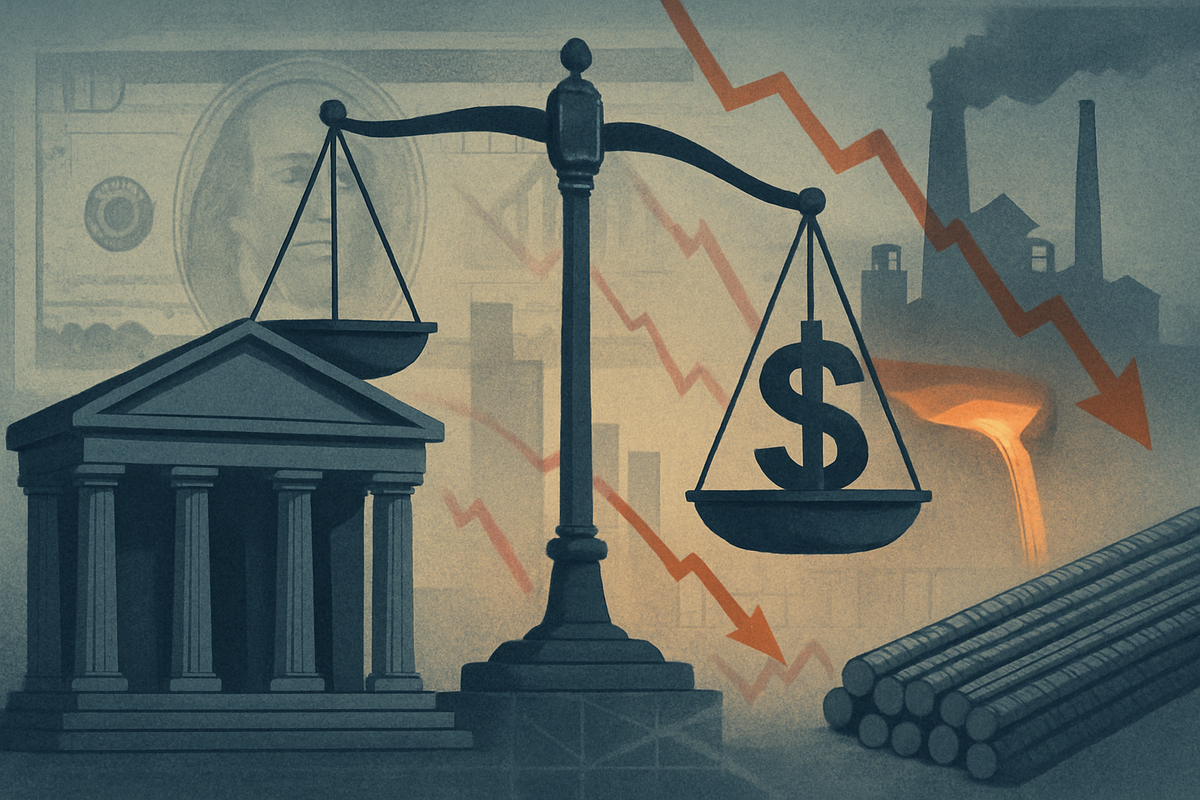
Dallas, TX – September 30, 2025 – Commercial Metals Company (NYSE: CMC) has announced its intention to appeal an adverse ruling in the long-running Pacific Steel Group (PSG) litigation. This decision comes after a U.S. District Court upheld a November 2024 jury verdict that found CMC liable for antitrust violations, potentially exposing the steel giant to $330 million in trebled damages plus legal fees. The appeal signals a continued, high-stakes legal battle that could significantly impact CMC's financial outlook and introduce new dynamics into the competitive landscape of the steel commodity market, particularly in California.
The immediate implication for CMC is a substantial financial overhang and heightened uncertainty for investors. With the court affirming the original verdict, the company now faces the daunting task of navigating an appeal process while confronting a material financial liability that could strain its balance sheet and affect its capital allocation strategies. The steel industry, already sensitive to economic shifts and supply-demand imbalances, will be closely watching how this legal saga unfolds and its potential ripple effects on regional pricing and competitive practices.
Anatomy of an Antitrust Challenge
The legal entanglement began on October 30, 2020, when Pacific Steel Group (PSG) filed an antitrust lawsuit against Commercial Metals Company (NYSE: CMC) in the U.S. District Court for the Northern District of California. PSG alleged that CMC violated federal and California state antitrust laws by entering into an exclusivity agreement with Danieli Corporation, a key supplier of micro-mill equipment. This agreement, PSG contended, was designed to prevent it from establishing a competing rebar mill in California.
The case progressed to a jury trial on October 22, 2024, following the denial of both parties' motions for summary judgment on June 10, 2024. A mere two weeks later, on November 5, 2024, a unanimous nine-member federal jury delivered a verdict against CMC, finding the company liable for multiple antitrust violations. The jury determined that CMC's exclusivity contract with Danieli constituted an unreasonable restraint of trade and directly harmed PSG's plans to develop a new micro-mill. The initial damages awarded to PSG amounted to $110 million, covering lost profits, transportation savings, fabrication cost savings, and increased mill purchase costs due to inflation. Under antitrust statutes, this figure is trebled, bringing CMC's potential liability to a staggering $330 million, in addition to attorneys' fees.
Following the November 2024 verdict, CMC immediately voiced its disappointment and declared its intention to appeal. This intention was solidified on September 29, 2025, when the U.S. District Court for the Northern District of California denied CMC's post-trial motions, thereby upholding the jury's verdict. On September 30, 2025, CMC publicly reaffirmed its commitment to appealing this latest ruling to the U.S. Court of Appeals for the Ninth Circuit, asserting its belief in the integrity of its business practices. While specific market reactions on September 30, 2025, are still emerging, the significant financial exposure and the prospect of a prolonged legal battle are likely to introduce considerable uncertainty for investors, echoing negative sentiment observed after the initial verdict in late 2024.
Winners, Losers, and Market Shifts
The primary "loser" in the short term, assuming the verdict holds, is undoubtedly Commercial Metals Company (NYSE: CMC). The potential $330 million liability, representing approximately 5.3% of its current market capitalization of around $6.32 billion, is a material financial event. This amount, coupled with ongoing legal expenses, will necessitate careful financial planning and could impact CMC's near-term earnings, dividend policies, and capacity for growth investments. Previously, CMC had not recorded a liability for this matter, believing a loss was not probable, which means a significant accounting adjustment will be required. The company will need to meticulously manage this financial strain while attempting to uphold its operational efficiency and market standing.
Conversely, Pacific Steel Group (PSG) stands to be the significant "winner" if the verdict is ultimately upheld. The substantial damage award would not only compensate PSG for alleged past harms but also potentially empower its future endeavors in the rebar market. PSG's legal team has already highlighted the broader implications, stating that the verdict could "return to California the production of rebar" and save rebar consumers in the state more than $50 million annually by reducing "artificially increased steel prices." This suggests that the ruling aims to foster greater competition in the California rebar market, which could translate into higher supply and potentially exert downward pressure on rebar prices in the region. This scenario could affect other steel producers (e.g., Nucor Corporation (NYSE: NUE), Steel Dynamics Inc. (NASDAQ: STLD)) operating in or considering entry into the California market, compelling them to adapt to a more competitive pricing environment.
Broader Industry Implications and Precedents
This antitrust ruling against Commercial Metals Company (NYSE: CMC) transcends the immediate parties, fitting into a broader trend of increased scrutiny on competitive practices within concentrated industries. The steel sector, characterized by significant capital investment and often regional dominance, is particularly susceptible to such challenges. The verdict sends a clear message that exclusivity agreements, especially those perceived to stifle competition and market entry, will face rigorous examination under antitrust laws. This could lead other steel producers and heavy industry players to review their own contractual arrangements and market strategies to ensure compliance and avoid similar legal entanglements.
The potential ripple effects extend to the entire supply chain. If the ruling indeed fosters greater competition and leads to lower rebar prices in California, construction companies and other rebar consumers in the region could benefit from reduced material costs. This could, in turn, influence project viability and profitability in the construction sector. While regulatory or policy implications are not explicitly defined, a successful antitrust challenge of this magnitude reinforces the commitment of federal and state authorities to maintain fair competition. Historically, overturning jury verdicts on appeal is challenging, with legal experts citing success rates typically in the 20-25% range. This precedent underscores the difficulty CMC faces, even with a robust appeal strategy.
The Road Ahead: Scenarios and Strategic Pivots
The immediate future for Commercial Metals Company (NYSE: CMC) hinges on the appeal process, which legal experts suggest could take 1-2 years. During this period, CMC will likely be under intense pressure to manage its financial reserves and potentially explore settlement options, although its public stance indicates a vigorous defense. Short-term possibilities include continued legal expenses and market uncertainty, while long-term outcomes range from a rare successful appeal that overturns the verdict to a final affirmation of the $330 million liability. A settlement could also emerge as a middle ground, potentially reducing the final financial impact.
Strategically, CMC may need to re-evaluate its capital allocation. The need to provision for a potentially massive liability could divert funds from share buybacks, dividends, or strategic growth initiatives. The company might also need to adjust its operational strategies to reflect the intensified competition in the California rebar market, potentially by focusing on cost efficiencies or diversifying its product offerings or geographic reach. For the broader market, the case presents both challenges and opportunities. Increased competition could challenge established players but also open doors for new entrants or expansion for existing ones looking to capitalize on potentially lower barriers to entry in the rebar sector.
Conclusion: A Defining Moment for CMC and the Steel Market
The adverse ruling and Commercial Metals Company's (NYSE: CMC) subsequent appeal in the Pacific Steel Group litigation mark a defining moment for the company and hold significant implications for the steel commodity market. The core takeaway is CMC's substantial financial exposure, estimated at $330 million plus legal fees, which will undoubtedly be a central focus for the company's management and investors in the coming months and years. While CMC vows to defend its position vigorously, the historical difficulty of overturning jury verdicts on appeal suggests a challenging path ahead.
Moving forward, the market will closely monitor the progress of CMC's appeal to the U.S. Court of Appeals for the Ninth Circuit. Investors should pay particular attention to any updates on the legal proceedings, CMC's financial statements regarding provisions for the liability, and any strategic shifts the company undertakes to mitigate the impact. Beyond CMC, the case serves as a powerful reminder of the importance of antitrust compliance and the potential for significant financial and reputational repercussions for companies found to be stifling competition. The outcome could reshape the competitive dynamics of the California rebar market, potentially leading to increased supply and more competitive pricing for consumers.
This content is intended for informational purposes only and is not financial advice.




